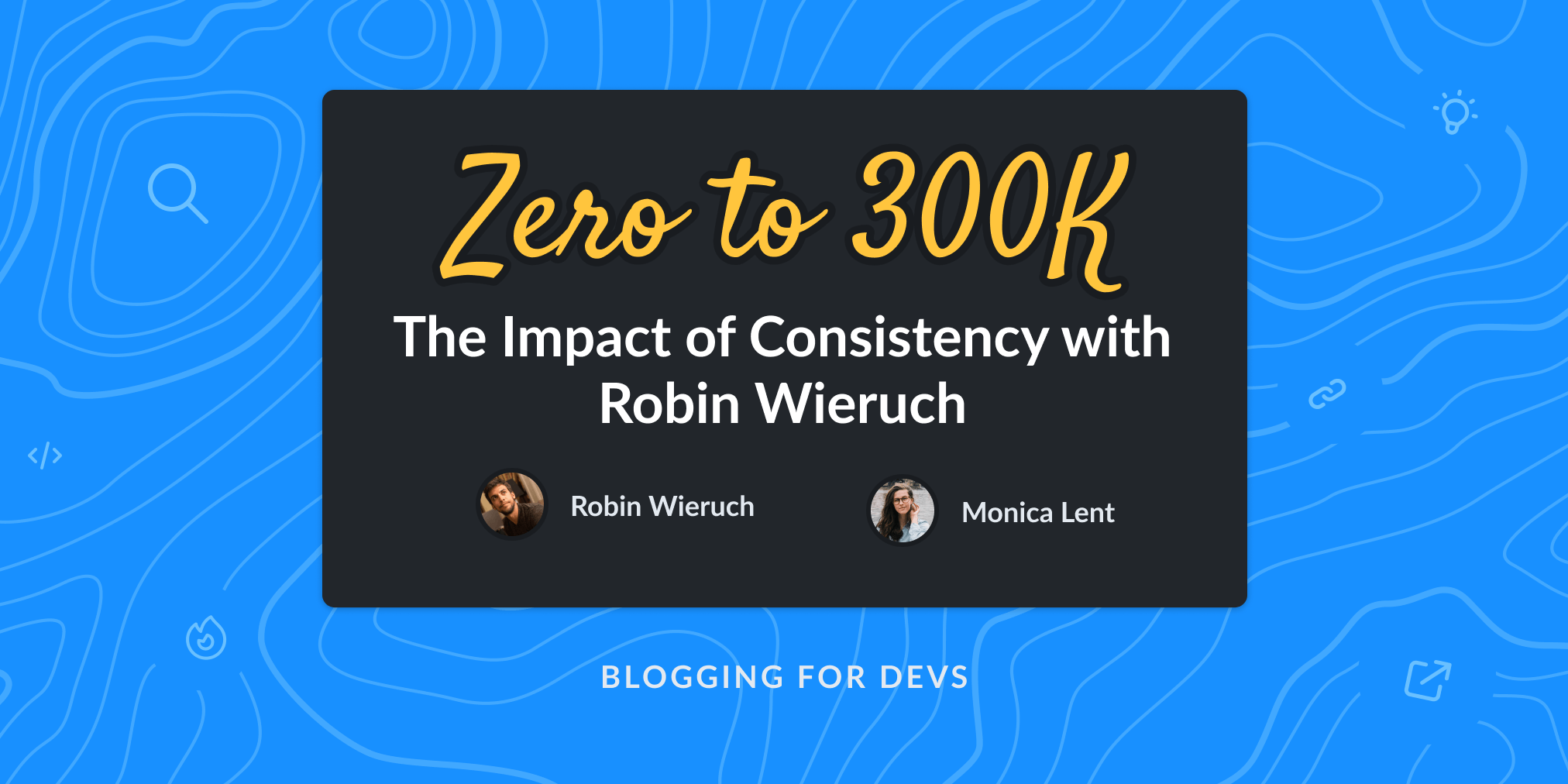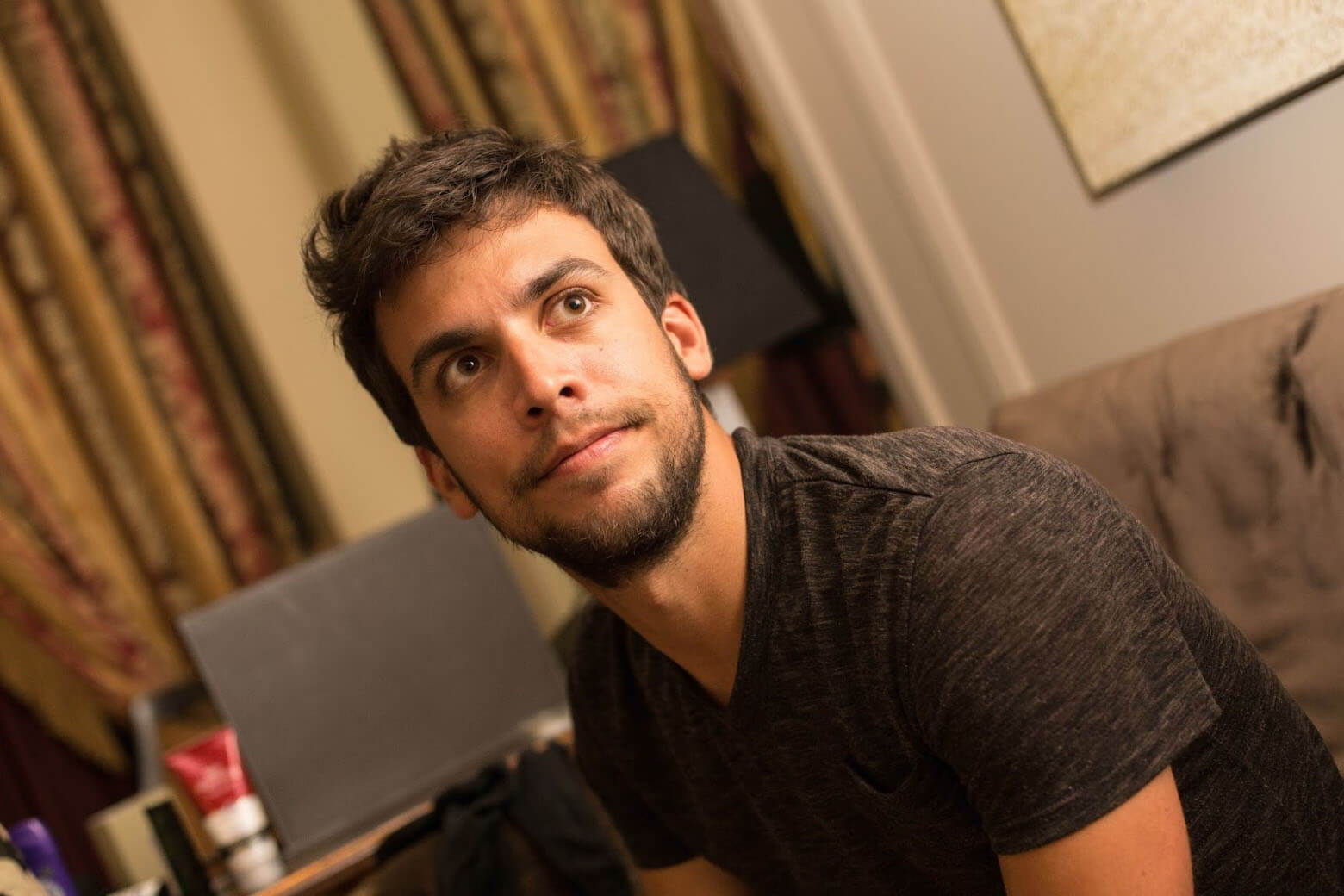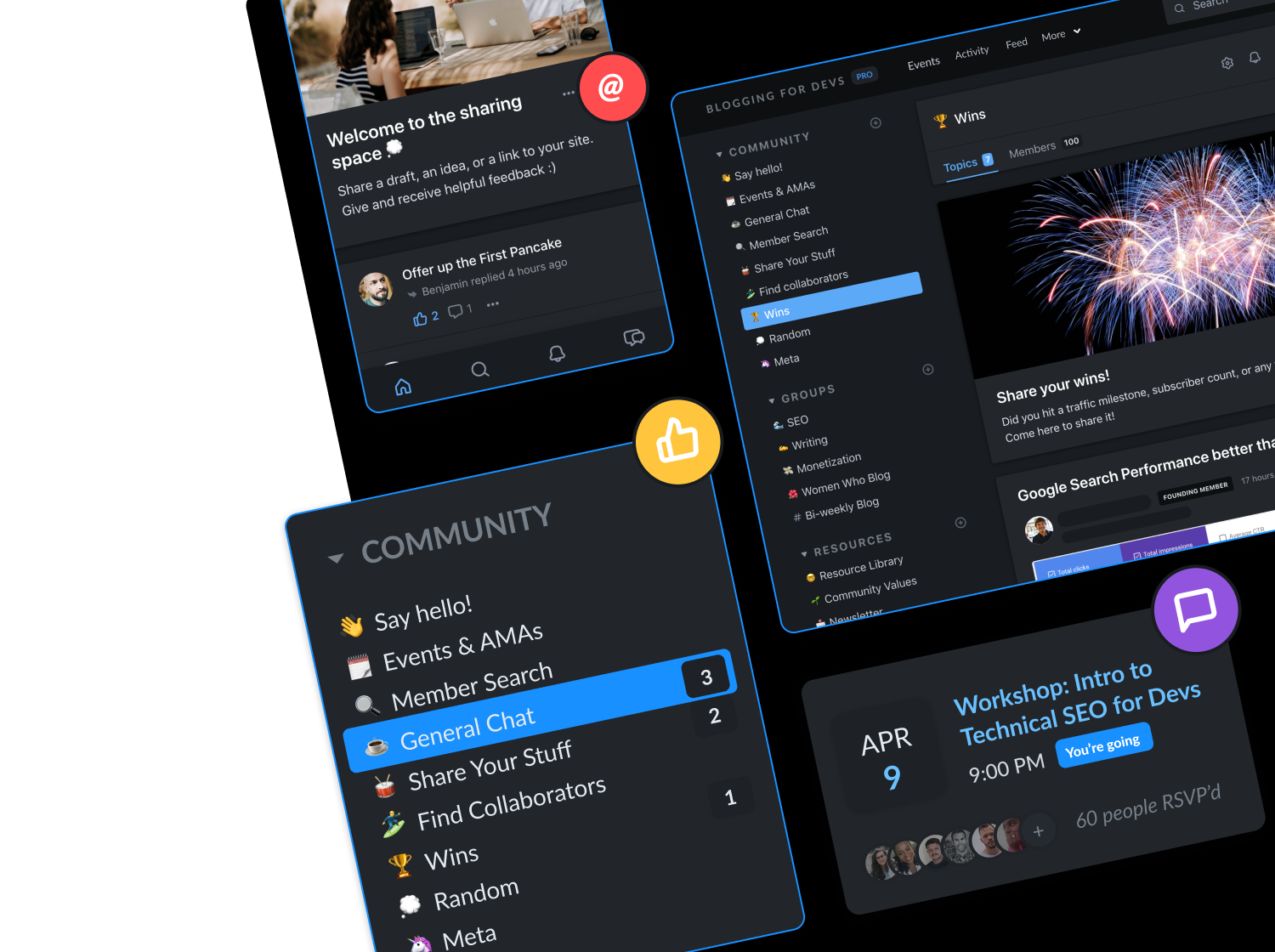From Zero to 300k Monthly Readers: The Impact of Consistency with Robin Wieruch

Monica Lent published

Hey everyone! I'm really excited to be talking with today with Robin Wieruch.
You might know Robin for his break-out ebook The Road to React or the other courses he's since created about Redux, GraphQL, and Firebase. His website is also sure to pop up in the search results whenever you google for solutions to common technical challenges in JavaScript as one of the top React blogs.
Robin and I have known each other for years now, and it's been super inspiring to watch how he shaped the career he has today through blogging (as well as to see him work from tropical destinations all around Southeast Asia 🏝).
In this interview, Robin shares:
- What helped him grow his blog early in his journey
- How he reached 300,000 monthly readers in four years
- His advice for new bloggers looking to build a readership from scratch
- What it's like blogging in a foreign language (and how to use it to your advantage)
- After over 250 blog posts, his tips for turning blogging into a sustainable habit
Let's meet Robin and learn more :)

Hey Robin! Thanks so much for being here. Can you tell us a bit about your background and why you started blogging?
Hi Monica. Sure! I am a German software engineer from Berlin who enjoys traveling around in Southeast Asia :-)
In 2017, I quit my full-time job and started to work with companies on their projects as an independent developer. So far I love the journey and wouldn't want to change it.
And yeah, all of it as a result of my blog!
In 2016, I started to write about my learnings in tech on my blog and that's it: What started as a reinforcement for my own learnings as a developer grew into a blog with more than 300,000 monthly readers.
If you had asked me back in 2016 what I thought about blogging, I would have told you that I am late to the party and blogging was already a thing a couple of years ago. I never thought that I could have a successful blog one day.
That's amazing, 300,000 monthly readers is massive. How do most people find your blog?
To be honest, these days most people find my content whenever they search for a solution to their problem on Google.
While releasing a new piece on social media has its fair share of spikes in visitors, most of my traffic comes from organic search via search engines.
However, it doesn't start with organic traffic when you have a fresh website.
When I started writing on my blog, I noticed only a few spikes when my articles got picked up on social media.
I think, especially in the early days it's super important to have people who believe in you: One of my first blog posts got retweeted by Dan Abramov and I am still grateful for that moment and opportunity he gave me there.
From when you started in 2016, how long did it take you to start seeing your readership really pick up?
Seeing traction of a growing readership comes with consistency in writing. I believe roughly 3-6 months into writing one article per week should yield the first results.
However, for me the real traction began after 18 months into blogging at the beginning of 2018. Anyway, as you can see it’s not a one hit wonder, you have to put in the work over a longer period of time.

If you are active on social media, it's a win-win situation because you grow both channels with the same content.
In addition, sharing the content is essential for the feedback loop, because a tight feedback loop motivates you, helps you to stay on track, and gives you confidence in your writings.
If you simply write down content without giving your stuff to someone to read, you are tapping in the dark whether it's useful to people or not.
So I know you do consulting and release products like ebooks and courses. How did blogging help you shift to working as independent developer and creator full-time?
When I quit my last full-time job in 2017, I only had my website with a few articles and a free book about React.
It wasn't much to start with, but I saw potential in it.
In addition, it was a time when I considered changing jobs anyways, so I took my chances to become a remote and independent software developer.
I knew I was in for a marathon and not a sprint, so every one or two weeks I wrote a blog post about a topic that interested me.
Now, three years later, I have found myself in a position where I have never had to actively reach out for opportunities, because all of them — from giving workshops for React and GraphQL, offering advice as a consultant for companies, and selling books about tech topics on my website — were generated as a side effect of my blog.
So without blogging, I wouldn't have stood a chance.
I am not big at networking, speaking at conferences, social media, or joining a podcast; so writing on my website is most of what powers my professional livelihood as a software engineer.
As a natural introvert, I am super grateful that I found this channel to express myself.
Speaking of expressing yourself, you're not a native English-speaker but you blog in English. What's that been like for you?
Thank you for addressing this topic, because it's clearly an underestimated issue in the developer community.
People always say that they cannot become a developer if they don't know math. For most developer jobs these days that's not true anymore.
However, what they still need to know is English.
Lots of educational content is written in English. This is not accessible for a lot of people around the world. Even in Germany there are lots of students who don't speak English well enough.
It's still a very privileged situation to be in, to be able to speak English fluently or to even be a native English speaker.
But that's where people who don't feel comfortable with English can fill the gap.
You can start writing your blog in your native language.
The advantages: You don't compete with the whole world and you can get ideas from English content that has already been written to get you started. It may give you an advantage on your local job market as well.
You can also ask authors of English blog posts if you are allowed to translate their content. If you provide them with a link to their post in your post, it's a win-win situation for both. They may even share your work on social media for you.
If you don't believe me that there is still a niche for other languages than English, check out the popularity of this Chinese translation of my React book or the translations of the official React documentation.
Use it to your advantage to be a non-native English speaker. There is still a lot of work to do to get people around the world on the same level. And it can be your mission to help them. Be proud of YOUR native language!
In that case, what ultimately made you decide to blog in English instead of German?
I started to write in English because I wanted to have it as an outlet to exercise English the same way I wanted to have the blog to exercise coding.
I don't want to tell you how many times I wrote the word "neccessary" instead of "necessary" though!
There are still many mistakes in my articles, I get lots of pull requests on GitHub fixing these mistakes, and my proofreader has lots of work to do whenever I handover a new book to him.
Heck I guess even this interview is full of mistakes xD
However, you only get better with practice, so jump right into it.
I saw that you have over 250 posts on your blog! How often do you publish new blog posts and how do you stay motivated to keep writing?
If I am motivated, I try to publish one article every week. But I am not a robot, so there are weeks when I just have a break :-)
Actually burnout for writers is a real thing and it hits you super hard if your livelihood depends on it. So taking a break is essential if you don't feel like writing.
Also, taking it to the extremes isn't advisable:
I wrote one book of mine in two weeks on a solo-trip to Malaysia and ended up in a rural hospital with an eye infection after having vision loss alone in a shitty hostel in the middle of the night. But that's another story to tell!
When I am working for more than one client at a time or have an intensive 1-week workshop, it can become quite stressful to run a blog on the side.
So there are times when I just have to take a break from writing for a month/week depending on the situation.
But Google doesn't like breaks and penalizes it, so whenever I know that there is a spike of work on the horizon, I try to write a few articles in advance to mitigate the risk.
If I feel like writing, I try to schedule a writing session every morning before the real work starts. It doesn't need to be something for my blog or a new book, maybe just thoughts and other stuff, but it helps me to just get things on paper.
I try to tackle topics that excite me, because it's easier to write about these than just another idea from my backlog which often can feel like a chore.
What's the most important lesson the Blogging for Devs community can learn from your experience?
If writing feels like a chore to you, don't force yourself into it.
Maybe try different channels for audio (e.g. Podcast) or video (YouTube) and see what fits best for you first.
I started writing just for the sake of reinforcement learning. Eventually, people read my stuff and that's when the traction started.
Don't put too much pressure on yourself. Instead enjoy the journey. Once you enjoy it, it's easy to transform your writing sessions into a habit.
That's great advice. If you don't like something, it's hard to force yourself. Last question: where can people go to follow what you're up to?
The interview probably shows that it's best to find me and my stuff on my website :-) There you can also find my newsletter for all the tech I am writing about.
If people are more into social media, they can find me on Twitter as well.
Thank you so much for the interview Monica (: All the best for this journey!
Did you enjoy learning about how blogging helped Robin transition his career as a developer? Click here to let him know on Twitter!
You don't have to be Twitter-famous to grow your blog as a developer.
Take the FREE 7-Day Blogging for Devs Email Course and learn how to grow your blog without an existing audience (!) through great writing and SEO.
Learn how to grow your blog as a developer without an existing audience through great writing and SEO.
